Illegal drug trade in El Salvador has included, according to some sources, trans-shipping of cocaine by the Nicaraguan Contras.
Former DEA agent Celerino Castillo alleged that during the 1980s Ilopango Airport in El Salvador was used by Nicaraguan Contras for drug smuggling flights with the knowledge and complicity of the CIA. These allegations were part of an investigation by the United States Department of Justice Office of the Inspector General. [1] Castillo also testified before the House Permanent Select Committee on Intelligence. Between 1996 and 1998 the Central Intelligence Agency investigated and then published a report about its alleged involvement in cocaine sales in the US. This was prompted by the journalist Gary Webb's report in the San Jose Mercury News alleging that the CIA was behind the 1980s crack epidemic. [2]
El Salvador is one of the biggest sources for human trafficking. Most victims are females who are sold mainly for sex and children for forced labor. Trafficking offenders use fraudulent documentation to facilitate the movement of foreign victims. Salvadorans have been subjected to forced prostitution in Guatemala, Mexico, Belize, the United States, Spain, and Italy. [3]
As of July 2024, 81,110 [4] people accused of gang affiliation have been arrested. The large influx of prisoners has overwhelmed the prisons in El Salvador. Human rights groups have expressed concern that the arrests were unjustified and had little to do with gang violence. Multiple U.S. government representatives expressed concern about the violence taking place in the country and the methods used to stop it. Following a spike in murders, the El Salvador president Nayib Bukele ordered law enforcement to arrest all suspects. [5]
For years El Salvador maintained one of the highest murder rates in the world. In 2022 following the crackdown, the murder rate was reported to have decreased by 56.8%. Authorities registered 496 homicides in 2022, down from 1,147 in 2021. The government did not include deaths that involved law enforcement and gang violence. Measures taken by the El Salvadorian government, such as the arrests of over 58,000 people without trial, have drawn criticism from human rights groups. Human Rights Watch reported police were given arrest quotas, leading to arrests based on insufficient evidence. Despite the objections, public approval for the crackdowns remains high. [6] [7]

The Contras were the various right-wing rebel groups that were active from 1979 to 1990 in opposition to the Marxist Sandinista Junta of National Reconstruction Government in Nicaragua, which had come to power in 1979 following the Nicaraguan Revolution. Among the separate contra groups, the Nicaraguan Democratic Force (FDN) emerged as the largest by far. In 1987, virtually all Contra organizations were united, at least nominally, into the Nicaraguan Resistance.
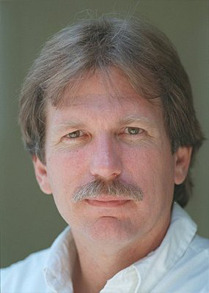
Gary Stephen Webb was an American investigative journalist.
Oscar Danilo Blandón Reyes is a Nicaraguan born drug trafficker who is best known as one of the main subjects of the 1996 newspaper series "Dark Alliance" by reporter Gary Webb.

The United States Central Intelligence Agency (CIA) has been accused of involvement in the trafficking of illicit drugs. Books and journalistic investigations on the subject that have received general notice include works by the historian Alfred McCoy, professor and diplomat Peter Dale Scott, journalists Gary Webb and Alexander Cockburn, and writer Larry Collins. These claims have led to investigations by the United States government, including hearings and reports by the United States House of Representatives, Senate, Department of Justice, and the CIA's Inspector General. The various investigations have generally not led to clear conclusions that the CIA itself has directly conducted drug trafficking operations, although there may have been instances of indirect complicity in the activities of others.

The Kerry Committee was a US Senate subcommittee during the 100th United States Congress that examined the problems that drug cartels and drug money laundering in South and Central America and the Caribbean posed for American law enforcement and foreign policy. The Sub-Committee was chaired at the time by Democratic Party Senator John Kerry from Massachusetts so the name of the committee and the report are often referred to under his name.

Dark Alliance: The CIA, the Contras, and the Crack Cocaine Explosion is a 1998 book by journalist Gary Webb. The book is based on "Dark Alliance", Webb's three-part investigative series published in the San Jose Mercury News in August 1996. The original series claimed that, in order to help raise funds for efforts against the Nicaraguan Sandinista government, the CIA supported cocaine trafficking into the US by top members of Nicaraguan Contra Rebel organizations and allowed the subsequent crack epidemic to spread in Los Angeles. The book expands on the series and recounts media reaction to Webb's original newspaper exposé.
A number of writers have alleged that the United States Central Intelligence Agency (CIA) was involved in the Nicaraguan Contras' cocaine trafficking operations during the 1980s Nicaraguan civil war. These claims have led to investigations by the United States government, including hearings and reports by the United States House of Representatives, Senate, Department of Justice, and the CIA's Office of the Inspector General which ultimately concluded the allegations were unsupported. The subject remains controversial.
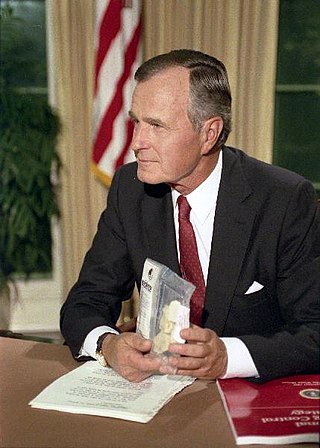
The crack epidemic was a surge of crack cocaine use in major cities across the United States throughout the entirety of the 1980s and the early 1990s. This resulted in a number of social consequences, such as increasing crime and violence in American inner city neighborhoods, a resulting backlash in the form of tough on crime policies, and a massive spike in incarceration rates.

The Mexican drug war is an ongoing asymmetric armed conflict between the Mexican government and various drug trafficking syndicates. When the Mexican military intervened in 2006, the government's main objective was to reduce drug-related violence. The Mexican government has asserted that their primary focus is dismantling the cartels and preventing drug trafficking. The conflict has been described as the Mexican theater of the global war on drugs, as led by the United States federal government.
Celerino Castillo is a former agent for the United States Drug Enforcement Administration (DEA).

The Sinaloa Cartel, also known as the Guzmán-Zambada Organization, the Federation, the Blood Alliance, or the Pacific Cartel, is a large, international organized crime syndicate based in the city of Culiacán, Sinaloa, Mexico that specializes in illegal drug trafficking and money laundering.
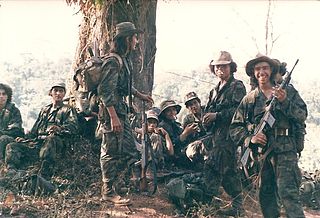
CIA activities in Nicaragua were frequent in the late 20th century. The increasing influence gained by the Sandinista National Liberation Front, a left-wing and anti-imperialist political party in Nicaragua, led to a sharp decrease in Nicaragua–United States relations, particularly after the Nicaraguan Revolution. In 1981, President Ronald Reagan authorized the Central Intelligence Agency to support the Contras, a right-wing Nicaraguan political group to combat the influence held by the Sandinistas in the Nicaraguan government. Various anti-government rebels in Nicaragua were organized into the Nicaraguan Democratic Force, the first Contra group, at the behest of the CIA. The CIA also supplied the Contras with training and equipment, including materials related to torture and assassination. There have also been allegations that the CIA engaged in drug trafficking in Nicaragua.
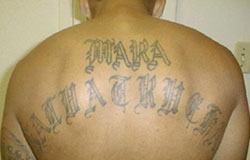
Mara Salvatrucha, commonly known as MS-13, is an international criminal gang that originated in Los Angeles, California, in the 1980s. Originally, the gang was set up to protect Salvadoran immigrants from other gangs in the Los Angeles area. Over time, the gang grew into a more traditional criminal organization. MS-13 has a longtime rivalry with the 18th Street gang.
A drug lord, drug baron, kingpin, or lord of drugs is a type of crime boss in charge of a drug trafficking network, organization, or enterprise.
Crime in Honduras has become a growing matter of concern for the Honduran population in recent years. Honduras has experienced alarmingly high levels of violence and criminal activity, with homicide rates reaching a peak in 2012, averaging 20 homicides per day. Corruption, extortion, coercion, and drug smuggling also run rampant throughout Honduran society, preventing the nation from building trustworthy authorities like police, and severely limiting economic, social, or political progress. The situation has prompted international organizations and governments to offer assistance in combating crime in Honduras.
Rates of crime in Guatemala are very high. An average of 101 murders per week were reported in 2018. The countries with the highest crime and violence rates in Central America are El Salvador and Honduras. In the 1990s Guatemala had four cities feature in Latin America's top ten cities by murder rate: Escuintla, Izabal (127), Santa Rosa Cuilapa (111) and Guatemala City (101). According to New Yorker magazine, in 2009, "fewer civilians were reported killed in the war zone of Iraq than were shot, stabbed, or beaten to death in Guatemala," and 97% of homicides "remain unsolved." Much of the violent nature of Guatemalan society stems back to a 36-year-long civil war However, not only has violence maintained its presence in the post-war context of the country following the Guatemalan Civil War, but it has extended to broader social and economic forms of violence.

Crime in El Salvador has been historically extremely high due to the presence of various gangs. As of 2011, there were an estimated 25000 gang members at large in El Salvador; with another 43500 in prison. The best-known gangs, called maras in colloquial Salvadoran Spanish, are Mara Salvatrucha (MS-13) and their rivals 18th Street; maras are hunted by death squads, including Sombra Negra. Newer rivals include the rising mara, The Rebels 13. El Salvador is one of the three countries of the Northern Triangle of Central America, along with neighboring Guatemala and Honduras, which are all afflicted with high levels of violence.
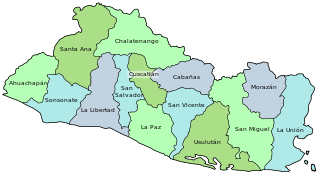
Sex trafficking in El Salvador is human trafficking for the purpose of sexual exploitation and slavery that occurs in the Republic of El Salvador. It is a country of origin, transit, and destination for sexually trafficked persons.
Over time, there has been an increase in sex trafficking in Central America. Because of the lack of financials, work opportunities and studies, women and men see sex work as the solution to their problems. In addition, the living conditions, poverty, and gang violence are the reason as to why a lot of people have been coerced into sex trafficking. These countries are working with their government and other countries in order to create laws to fight against sex trafficking.
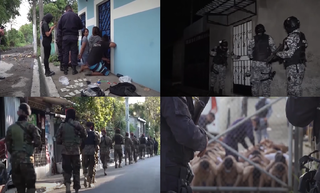
The Salvadoran gang crackdown, referred to in El Salvador as the régimen de excepción and the guerra contra las pandillas, began in March 2022 in response to a crime spike between 25 and 27 March 2022, when 87 people were killed in El Salvador. The Salvadoran government blamed the spike in murders on criminal gangs in the country, resulting in the country's legislature approving a state of emergency that suspended the rights of association and legal counsel, and increased the time spent in detention without charge, among other measures that expanded the powers of law enforcement in the country.